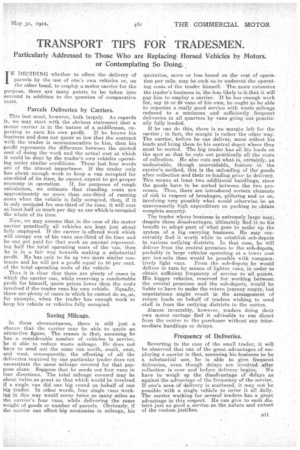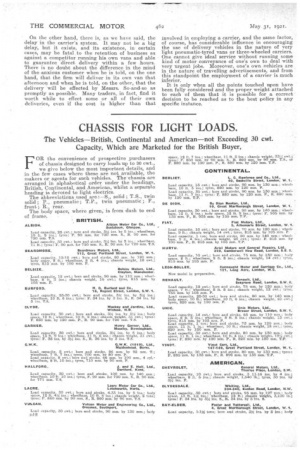TRANSPORT TIPS FOR. TRADESMEN.
Page 13

Page 14

If you've noticed an error in this article please click here to report it so we can fix it.
Particularly Addressed to Those Who are Replacing Horsed Vehicles by Motors, or Contemplating So Doing.
IN DECIDING whether to effect the delivery of parcels by the use of one's own vehicles or, on the other hand, to employ a motor carrier for the purpose, there are many points to be taken into account in addition to the question of comparative costs.
Parcels Deliveries by Carriers.
This last must, however, bulk largely. As regards it, we may start with the obvious statement that a motor carrier is in the nature of a middleman, ex pecting to earn his own profit. If he knows his business and does not quote so low that the contract with the trader is unremunerative to him, then his profit represents the difference between the quoted cost of doing the work and the actual cost at which it could be done by the trader's own vehicles operating under similar conditions. These last four words are of the utmost importance. If the trader only. has about enough work to keep a, van occupied for one-third of its time, he cannot expect to get proper economy in operation. If, for purposes of rough calculation, we estimate that standing costs are approximately no more than one-third of running costs when the vehicle is fully occupied, then, if it is only occupied for one-third of its time, it will cost at least half as much per day as one which is occupied the whole of its time.
Now, we may assume that in the case of the motor carrier practically all vehicles are kept just about fully employed. If the carrier is offered work which will occupy one of his vans one-third of its time and he can get paid for that work an amount representing half the total operating cosi s of the van, then he is in a fair way towards making a substantial profit. He has only to fix up two more similar contracts and he will get a profit equal to 50 per cent. of the total operating costs of the vehicle.
Thus it is clear that there are plenty of cases in which the carrier can, while reserving a comfortable profit for himself, quote prices lower than the costs involved if the trader runs his own vehicle. Equally, there are plenty of cases in which he cannot do so, as, for example, when the trader has enough work to keep his vehicle or vehicles fully occupied.
Saving Mileage.
In these circumstances, there is still just a chalice that the carrier may be able to quote an attractive figure. The reason is that, assuming he has a considerable number of vehicles in service, he is able to reduce waste mileage. He does not have to send out the same van north, south, east, and west, consequently, the effecting of all the deliveries required by one particular trader does not necessitate the same mileage covered for that purpose alone. Suppose that he sends out four vans in four directions. The total mile-age covered may be about twice as great as that which would be involved if a single van did one big round on behalf of one big trader. in .other words, four single vans working in this way would cover twice as many miles as the carrier's four vans, while delivering the same weight of goods or number of parcels. Obviously, if the carrier can effect big economies in mileage, his
quotation, more or less based on the cost of operation per mile, may be such as to undercut the operating costs of the trader himself. The more extensive the trader's business is, the less likely is it that it will pay him to employ a carrier. If he has enough work for, say 15 or 20 vans of his own, he ought to be able to organize a really good service with waste mileage reduced to a minimum and sufficiently frequent deliveries in all quarters by vans going out practically fully loaded.
If he can do this, there is no margin left for the carrier ; in fact, the margin is rather the other way. The carrier, before he can deliver, must collect his loads and bring them to his central depot. where they must be sorted. The big trader has all his loads on the spot so that he cuts out pra-,ctically all the costs of collection. He also cuts out what is, certainly, an undesirable, though unavoidable, feature in the carrier's method, this is the unloading of the goods after collection and their re-loading prior to delivery. This means at least two additional handlings, since the goods have to be sorted between the two processes. Thus, there are introduced certain elements of risk in respect of breakages, pilfering and so on, involving very possibly what would otherwise be an unnecessarily high expenditure on packing to obtain complete security.
The trader whose business is extremely large may, despite these disadvantages, ultimately, find it to his benefit to adopt part of what goes to make up the system of a big carrying business. He may conceivably find it worth while to establish sub-depots in various outlying districts. In that case he will deliver from the central premises to the subedepots, probably in large vehicles operating at a lower cost per ton-mile than would be possible with compara
tively light vans. From the sub-depots he would deliver in turn by means of lighter vans, in order to obtain sufficient frequency of service to all points. His bigger vehicles, reserved for workiug between the central premises and the sub-depots, would be liable to-have to make the return journey empty, but negotiations might result in the arrangement of return loads on behalf of traders wishing to send ,stuff in from the outlying districts to the centre.
Almost invariably, however, traders doing their own motor cartage find it advisable to run direct from the centre to the purchaser without any intermediate handlings or delays.
Frequency of Deliveries.
Reverting to the ease of the small trader, it will be observed that one of the great advantages of employing a carrier is that, assuming his business to be a substantial one, he is able to give frequent deliveries, even though delays are involved after collection is over and before delivery begins. We have to weigh up the disadvantage of delays as against the advantage of the frequency of the service. If one's area of delivery is scattered, it may not be passible with a single vehicle to cover it all daily. The carrier working for several traders has a great advantage in this respect. He can give to each district just as good a service as the nature and extent of the custom justifies. On the other hand, there is, as we have said, the delay in the carrier's system. It may not be a big delay, but it exists, and its existence, in certain cases, may be fatal .to the retention of business as against a competitor running his own vans and able to guarantee direct delivery within a few •hours. There is no doubt about the difference in the mind of the ,anxious customer when be is told, on the one hand, that the firm will deliver in its own van that afternoon and when, he is told, on the other, that the delivery will be effected by Messrs. So-and-so as promptly as possible. Many traders, in fact, find it worth while to effect some or all of their own deliveries, even if the cost is higher than that
involved in employing a carrier, and the same factor, of course, has considerable influence in encouraging the use of delivery vehicles in the nature of very light pneumatie-tyred vans or three-wheeled carriers, One cannot give ideal service without running some kind of motor conveya-nce of one's own to deal with very urgent jobs. Moreover, one's own ;vehicles are in the nature of travelling advertisements, and from this standpoint the employment of a carrier is much inferior.
It is only when all the points touched upon have been fully considered and the proper weight attached to each of them that it is possible for a correct decision to be reached as to the best policy in any specific instance.










































